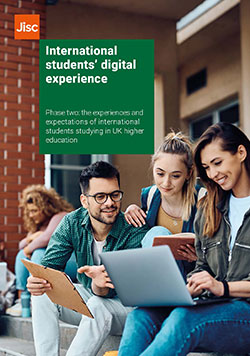International students’ digital experience phase two: experiences and expectations
The voices of over 2000 higher education international students describe their digital border crossings and the digital shocks that impact the learning experience.

UK universities are providing education to a large and diverse population of international students, who as of 2021/22 made up 67% of full-time UK taught postgraduates (PGT) and 17% of undergraduates who come to the UK to study. UK higher education providers (HEPs) are accepting students from diverse global areas, and the proportional representation of these areas has changed rapidly in recent years.
In April 2023, we published the first phase of research that aimed to better understand the international student digital experience (ISDX) for those who chose the UK as their study destination. We concluded that the changing nature of the UK international student cohort may require the development of new and different support to allow students to transition successfully into the UK higher education learning environment and get the most out of the courses they have invested in.
Our second phase of research has involved working directly with international students to hear their experiences, attitudes and opinions about using digital technologies both on their course and in their wider living experience. This report summarises their feedback and provides recommendations to the sector on how to improve the digital experiences of international students.
Key findings
- Civil digital infrastructure and experience of digital teaching and learning differed depending on international students’ home global area
- Home country civil digital infrastructure shapes digital practice, which in turn forms the basis of assumptions about how digital will be accessed and used in the UK
- Home global area (a hypothesised proxy for ‘cultural norms’) influences how comfortably a student can involve themselves in various online behaviours
- Most international students were positive about the use of technology-enabled learning (TEL) on their course; notably, they appreciated how it gave them access to a wide range of digital resources, online libraries and recorded lectures
- Many had some initial challenges (‘digital shocks’) as they transitioned into the habits and expectations of TEL in UK higher education. They needed to understand at the start of a course how, when and why to use digital
- Most were using AI to support their learning and wanted more guidance on effective and appropriate practice
- They often struggled with practical issues relating to digital technologies, including setting up authentication and accessing university systems outside the UK
- Current digital practice was predominantly experienced as one-way (directed to the individual student) and transactional
- It is important for individual HEPs to actively consider the needs of both current and forthcoming international student cohorts and to embed this across several strategic areas (including business planning, equality, diversity and inclusion, curriculum design and student support)
Read the full report
pdf, 3.49 MB, 62 pages
Feedback from the sector
"This research provides some fascinating insights into our international students’ experiences and really challenges some of the existing narratives that we form policy on."
Professor Leanne de Main, deputy dean & associate pro vice chancellor education (transformation), Faculty of Business and Law, De Montfort University
"This project has illuminated the technological obstacles [international] students encounter and marks a significant stride toward enhancing our services. It's not just about welcoming international students; it's about ensuring they thrive in their academic pursuits and making the UK an even more competitive and inclusive destination for global education."
Dr Patrice Seuwou, associate professor in learning and teaching, Business Systems & Operations, University of Northampton
‘Digital fluency can make or break international students’ university experience especially when starting on an unequal footing. This report highlights the area where HE providers can target support to ensure international students grasp the nuts and bolts of digital platforms and resources.’
Obinna Okereke, project manager – student experience, Vice-Chancellor’s Office, Coventry University
Our thanks
We would like to extend our gratitude to the 14 UK HE providers and the international students who partnered with us in this research, together with the ongoing support and engagement from sector bodies, including Advance HE, British Council, BUILA, QAA, UCAS, UKCISA and UUKi.
Stay informed
Our research is split into four phases, with this report resulting from the first. Find out more about the project or register your interest to join our mailing list so that we can keep you up to date with our progress and share any subsequent reports.
Briefing papers
In March 2024, we published the first three briefing papers for the sector. These include a guide to facilitate conversations among staff and students to gather honest student feedback, a checklist for organisations to assess how they can better support international students’ digital experience, and a paper comparing the experiences of UK and international students based on our digital experience insights (DEI) survey data.
About the authors



I contribute to Jisc’s research, thought leadership and consultancy into the digital transformation of learning, teaching and assessment in higher education. In doing this, I work closely with Jisc members and experts from the UK HE sector to gather requirements to inform how Jisc can support the sector in the challenges they are facing in relation to digital transformation. Areas of current focus include research exploring the digital experience of international students studying in the UK and rethinking learning and curriculum design.